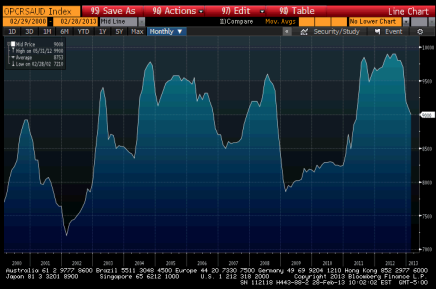Demand for their output is falling, but still plenty high to be ‘price setter’


It is the best leading indicator and what causes stocks to go up or down also causes a lot of other things to happen.
Greenspan: Ignore The Economy, “Only The Stock Market Matters”
By Tyler Durden
Feb 15 —Starting at around 1:50, Greenspan states the odds of sequester occurring are very high – in fact, the playdough-faced ex-Chair-head notes, “I find it very difficult to find a scenario in which [the sequester] doesn’t happen” But when asked how this will affect the economy, Awkward Alan is unusually clearly spoken – “the issue is how does it affect the stock market.”
While not so many of our leaders have taken the path to direct truthiness, Greenspan somewhat shocks a Botox’d and babbling Bartiromo when he admits “the stock market is the key player in the game of economic growth.”
Bartiromo shifts uncomfortably in her seat, strokes her imaginary beard and stares blankly as Greenspan explains that while the sequester will have a real effect on the real economy, “if the stock market can hold up through this, then the effect will be rather minor.”
He ends with a couple of wonderful truthisms – data shows that not only are stock markets a leading indicator of economic activity, they are a major cause of it – 6% of the change in the growth in GDP results from changes in the value of stocks and homes. So there it is – if we didn’t already know, straight from an old horse’s mouth – it’s all about stocks!
Fiscal problems? “The problem is so severe at this stage that unless we come to terms with it in a large way, we are running into very serious trouble,” but Dr. Greenspan, if stocks stay up, it’s all good right? Greenspan’s wealth effect meme is all there is…
Goes with the territory…
EU leaders strike deal on long-term austerity budget
By Mark John and Peter Griffiths
Feb 8 (Reuters)
Not conclusive but a bit of evidence the FICA hike is beginning to take a toll.
From Gail:
The Conference Boards Consumer Confidence Index decreased to 58.6, the weakest since November 2011, from a revised 66.7 in December
January 29 — Says Lynn Franco, Director of Economic Indicators at The Conference Board: Consumer Confidence posted another sharp decline in January, erasing all of the gains made through 2012. Consumers are more pessimistic about the economic outlook and, in particular, their financial situation. The increase in the payroll tax has undoubtedly dampened consumers spirits and it may take a while for confidence to rebound and consumers to recover from their initial paycheck shock. Consumers appraisal of current conditions deteriorated in January. Those claiming business conditions are good declined to 16.7 percent from 17.2 percent, while those stating business conditions are bad increased to 27.4 percent from 26.3 percent. Consumers assessment of the labor market has also grown more negative. Those saying jobs are plentiful declined to 8.6 percent from 10.8 percent, while those claiming jobs are hard to get increased to 37.7 percent from 36.1 percent.
Hi Warren,
Just published the program as per your suggestions.
Thank you for supporting me and Bulgarian people, currently living and dying in misery. Hopefully they will show better judgment than the American ones.
Regards,
Ryan
Bulgaria MMT
As previously discussed, the real answer to the ‘dependency ratio’ is in fact happening?
The trick is to let seniors collect full social security and their paychecks:
More Americans 75 and Older Keep Working
By Christine Dugas
January 1 (USA Today) — Sixty-five is the normal retirement age, but many Americans are working much later in life, and it’s not just because they need the money.
The number of workers who are 75 and older has skyrocketed by 76.7 percent in the past two decades, according to research by the AARP Public Policy Institute. “We are living longer, healthier lives,” says Kerry Hannon, author of Great Jobs for Everyone 50+. “And the types of work that people do is not as labor intensive as it was in our parents’ generation.”
Stephanie Kelton will be appearing on UP with Chris Hayes on MSNBC this Saturday January 12, 2013 at 8:00 AM Eastern.